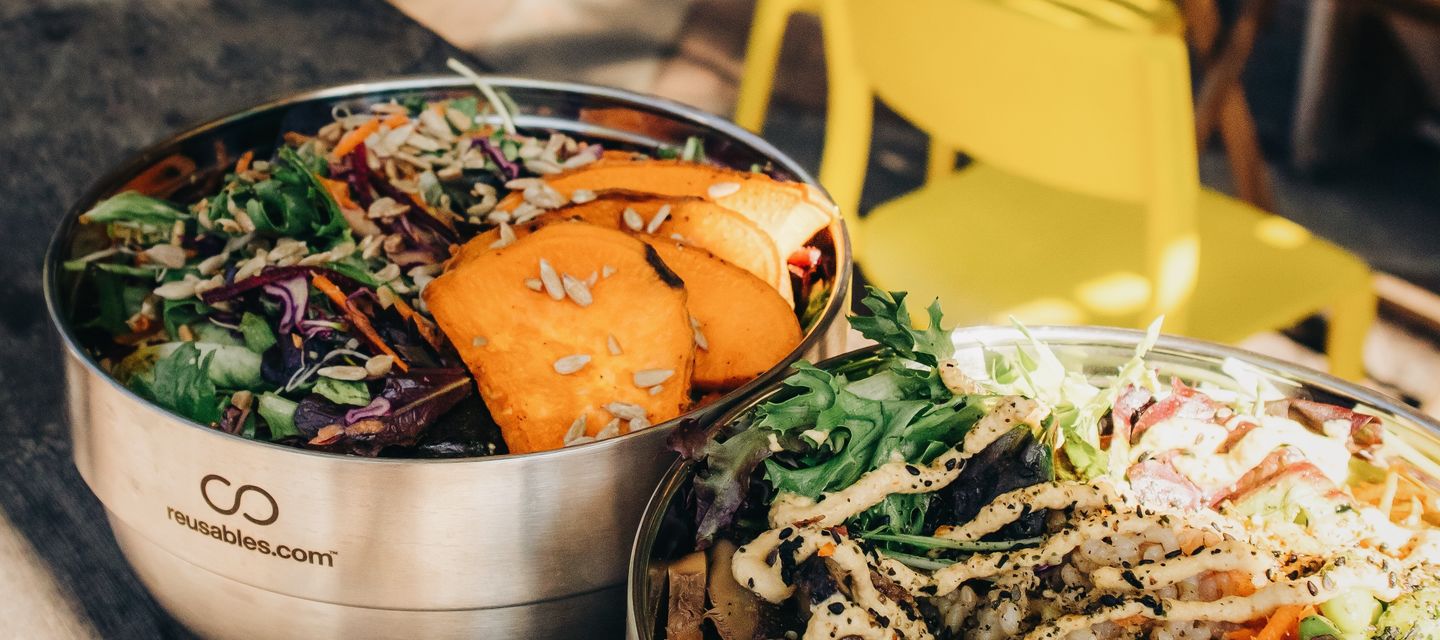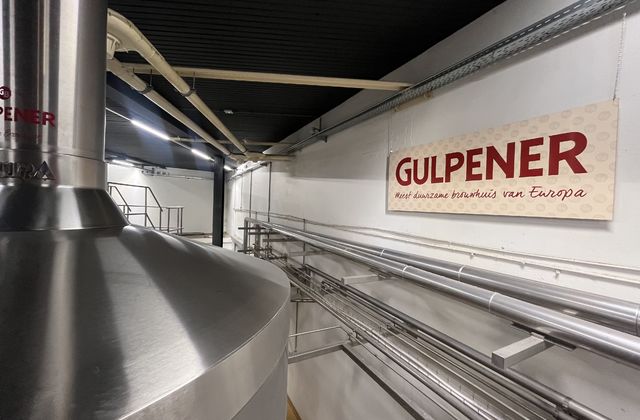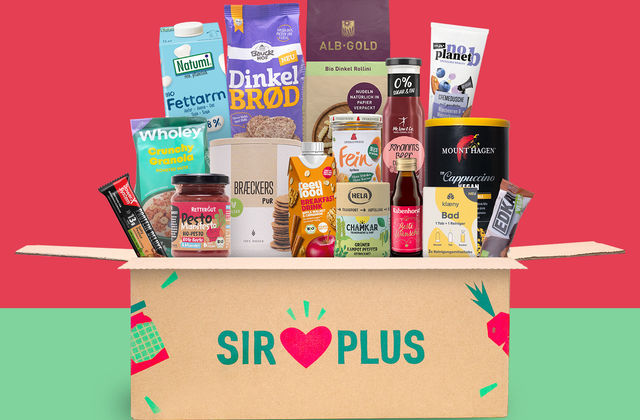What is it?
Reusables.com is a Canada-based reuse platform dedicated to reducing single-use packaging waste for food on university campuses, corporate offices, and cities (Reusables.com, 2024a). The platform uses various technologies to ensure an efficient and seamless reuse experience, such as IoT Smart Return Bins, mobile apps, student ID integrations, RFID, and QR tracking. They offer two categories of reuse containers: steel and durable plastic. Currently, Reusables.com is working with enterprise food service operations across North America and over 100 food businesses in Canada (Reusables.com, 2024).
Why is this important?
Over 430 million tons of plastic are created each year, with two-thirds discarded as waste after a single use (Padilla-Vasquez, 2024). If current patterns persist, the amount of plastic waste is projected to triple by 2060, leading to severe impacts on ecosystems and human health (Padilla-Vasquez, 2024). Single-use plastic is produced from fossil fuels, and the extraction and creation of these plastics emit vast amounts of greenhouse gases. For instance, the extraction of fossil fuels and their transportation alone is estimated to emit 1.5 to 12.5 million metric tons of greenhouse gases (Vasarhelyi, 2023). Landfills, where single-use plastics are disposed of, account for over 15% of methane emissions (Vasarhelyi, 2023). Plastics also have serious impacts on the ocean ecosystem. More than 11 million tons of plastics enter our ocean annually, in addition to the estimated 200 million tons that already flow through our marine environments (Morales-Caselles et al., 2021; Ocean Conservatory, 2024).
Main resource strategy: Slowing the resource loop with durable and reusable packaging as sustainable alternatives to single-use plastics for takeaway food and beverages.
Other resource strategies: Closing the loop with platforms and services that support recycling and reuse
Business model aspects:
- Value Proposition: Sustainable, reusable packaging solutions for food and beverages for customers and businesses.
- Value Creation & Delivery: Customers can get their 1st month free when downloading the app and pay CAD 5 per month to keep the subscription. To use Reusables.com containers, customers need to make a note in their takeout order, either through delivery apps (e.g. Uber Eats) or directly with partner businesses. Customers have 14 days to rinse and return the containers to partner businesses or Smart Return Bins (Resuables.com, 2021).
- Value Capture: Partner restaurants and grocery stores can save up to 50% on packaging costs (Resuables.com, 2024b). Reusables.com’s built-in tracking system, enabled by RFID and QR, ensures a 99% return rate for reusable containers (Resuables.com, 2024). Customers pay a small month fee to use the reusable containers.
Strategies for degrowth/ sufficiency (based on sufficiency strategies from Niessen & Bocken, 2021):
- No ownership + Price incentive: Through Reusables.com's reuse platform, customers can rent reusable containers when purchasing food in restaurants and grocery stores. This is a more sustainable and economical alternative to using single-use plastics as more cities in Canada are beginning to charge a fee or eliminate single-use plastics (Reusables.com. 2021).
Business model experimentation practices:
Anastasia Kiku and Jason Hawkins founded Reusables.com in 2020 in Vancouver, Canada. Since then, it has launched many successful pilots with known Vancouver restaurants and local markets (Reusables.com. 2021).
In April 2024, the Circular Innovation Council led a food container reuse pilot in Ottawa, Canada, at three major grocery retailers: Metro Inc., Sobeys Inc., and Walmart Canada (Choi, 2024). Customers can purchase food in reusable containers from participating locations and then return the containers to Smart Return Bins from Reusables.com for washing and redistribution.
Sources:
Choi, T. (2024). Metro, Sobeys, Walmart join Reuse Pilot Project in Ottawa. Sustainable Biz Canada. Accessed 03 June 2024 at: https://sustainablebiz.ca/metro-sobeys-walmart-join-reuse-pilot-project-in-ottawa
Morales-Caselles, C., Viejo, J., Martí, E., González-Fernández, D., Pragnell-Raasch, H., González-Gordillo, J. I., ... & Cózar, A. (2021). An inshore–offshore sorting system revealed from global classification of ocean litter. Nature Sustainability, 4(6), 484-493.
Ocean Conservancy. (2024). Plastic in the Ocean. Accessed 03 June 2024 at: https://oceanconservancy.org/trash-free-seas/plastics-in-the-ocean/
Padilla-Vasquez, D. (2024). Protect our planet from plastic pollution: 5 things to know. United Nations Foundation. Accessed 03 June 2024 at: https://unfoundation.org/blog/post/protect-our-planet-from-plastic-pollution-5-things-to-know/?gad_source=1&gclid=Cj0KCQjw0_WyBhDMARIsAL1Vz8szoZSqxLuqu015nD7YegKd1wi1nPzO9N6s8PIsO8cBk_U9nBZppbkaAgboEALw_wcB
Reusables.com (2021). Zero-Waste Packaging For Takeout, Adds First Grocery Retail Partner To Platform. Accessed 03 June 2024 at: https://reusables.com/blogs/news/reusables-com-zero-waste-packaging-for-takeout-adds-first-grocery-retail-partner-to-platform
Reusables.com. (2024a). Waste nothing. Accessed 03 June 2024 at: https://reusables.com/
Reusables.com. (2024b). Reuse for businesses. Accessed 03 June 2024 at: https://reusables.com/pages/for-businesses
Vasarhelyi, K. (2023). The impact of plastic on climate change. Environmental Center. Accessed 03 June 2024 at: https://www.colorado.edu/ecenter/2023/12/15/impact-plastic-climate-change#:~:text=The%20refinement%20of%20plastics%20emits,landfill%20size%20and%20these%20emissions
***
About project Circular X
Project Circular X is about ‘Experimentation with Circular Service Business Models’. It is an ambitious research project funded by the European Research Council (ERC) which supports top researchers from anywhere in the world. Project CIRCULAR X runs from 2020-2026. The project is led by Principal Investigator (PI) Prof Dr Nancy Bocken, who is joined by a multidisciplinary team of researchers at Maastricht Sustainability Institute (MSI), Maastricht School of Business and Economics, Maastricht University. The project cooperates with businesses who want to innovate towards the circular economy.
Project Circular X addresses a new and urgent issue: experimentation with circular service business models (CSBMs). Examples of such new business models include companies shifting from selling products to selling services and introducing lifelong warrantees to extend product lifetimes. However, CSBMs are far from mainstream and research focused on experimentation is little understood. The research aims to conduct interdisciplinary research with 4 objectives:
- Advancing understanding of CSBMs; their emergence and impacts
- Advancing knowledge on CSBM experimentation
- Developing CSBM experimentation tools
- Designing and deploying CSBM experimentation labs
Funding source
This project has received funding from the European Research Council (ERC) under the European Union’s Horizon 2020 research and innovation programme, grant agreement No. 850159.
Using of this information
When you refer to this case, please use the following source:
Circular X. (2024) Case study: Reusables.com - reuse solution for takeaways. Accessed from www.circularx.eu



